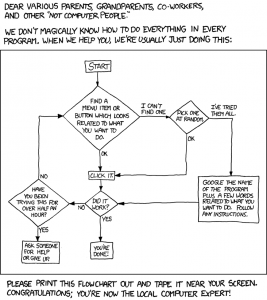Make your life easier by following these tips for providing tech support to your parents
My parents rely heavily on their computer for both work, interests and hobbies. Having not grown up immersed in computers and technology, they do not always have the confidence or experience to know how to solve problems when they encounter them.
I’m keen to help them get the most out of their computer, but only have so much time I can commit to ‘tech-support’. So over the years I’ve found a few simple things to have made a big difference to the effort I need to put in to help them.
By a combination of clever tools, low-tech solutions and gentle encouragement you can help increase your parents’ confidence at solving problems on their computer, and save yourself a lot of time and effort.
1. Get them to use the operating system you are most familiar with
In the past I’ve toyed with the idea of getting my parents on Linux or OSX, but really if they did that I’d be pretty useless when it came to helping them out. Even small problems would be a massive headache, as I’m much less familiar with the problems that come up and the common solutions.
So for me the go-to operating systems have been Windows XP and now Windows 7. But if you feel most confident with something else then get your parents to use it.
2. Get them a notebook to keep by their computer
I found that keeping a notebook by my parents’ computer marked a change in my ability to help my parents out. Suddenly all the little niggles they had could be figured out when I was visiting, rather than forgotten about. What’s more we could write down the solutions to to the problems, and make them easier to find for next time.
3. Encourage the XKCD approach to being a computer expert
I found that one thing that limited my parents’ ability to fix their own problems was not knowing how to go about getting started.This comic from XKCD explains the problem perfectly.
Print out this comic from XKCD and put it by your parents’ computer.
 By encouraging them to solve problems on their own, and develop ‘googling skills’, you’ll soon find that you won’t be called upon quite so often.
By encouraging them to solve problems on their own, and develop ‘googling skills’, you’ll soon find that you won’t be called upon quite so often.
4. Be Patient and Understanding
This could easily have been number one on the list. You’ve probably grown up surrounded by computers and technology and just ‘get’ it.
It is unlikely that the same can be said for your parents. So be patient, go slowly and expect to have to repeat things. They’ll appreciate it, and be much more likely to take in what your saying if they’re not flustered and you go at their pace.
5. Encourage their strengths
Maybe this is an obvious point, but don’t forget to encourage your parents when they seem to be getting something right. It’s all to easy to fall into a routine of helplessness when it comes to computer issues. If you come up against a problem you’ve helped them through before, encourage them to work back through what they did before (you did get them to write down the solution in a notebook, right?)
If you’re lucky enough to have two parents who are speaking to each other, encourage them to solve each other’s problems, too, rather than immediately going to you for help.
6. Make sure they know how to take screen shots
Knowing exactly what the problem or error is gets you a long way to finding the problem. If they don’t know already, teach your parents how to take screenshots. Write the instructions for how to do this in their “computer notebook” (see above) and get them to take a screenshot when they encounter an error, warning or annoyance. They can keep this saved for when you next visit or email it to you to ask for help.
Rather than asking them to remember every incomprehensible error and warning message was, you can quickly and easily see for yourself.
7. Use Windows Remote Assistance
Windows Remote Assistance lets you have temporary control over your parents computer. For most problems this will be overkill, but can be invaluable for sorting out trickier problems that your parents aren’t confident solving by themselves.
Remote assistance is also available with a bit of cajoling in windows 8.
8. Don’t be afraid of trying some advanced stuff
If your parents are fairly confident on their computer, you could try getting them to work on some more advanced things that they probably wouldn’t be aware of themselves.
It may not come immediately, and they might need some assistance, but with the right support you’ll have your parents doing all kinds of computer gymnastics.
I’ve had mine writing textbooks in Latex, wielding dual monitors, and setting up wireless networks.
9. Don’t be disheartened when your schemes don’t catch on
Some of my suggestions for advanced computer use have done down well (see point 8). Many more have not got off the ground as my enthusiasm for trying them has far outweighed my parents’ inclination to use them.
But don’t get disheartened, and keep suggesting things. If you see something a little bit more advanced that that you think might help them out in the long run, then give it a go. Talk them through it, and see if it takes off!